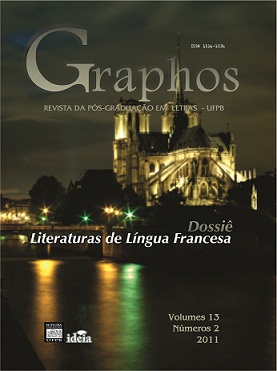Não posso continuar, vou continuar: reflexões sobre a falência da linguagem em Molloy, de Samuel Beckett
Keywords:
Samuel Beckett, Molloy, Modern French novel, Failure of languageAbstract
The aim of this article is to discuss the failure of language based on the analysis of the
novel Molloy, by Samuel Beckett (1906-1989). This novel belongs to the modern
French literature context and, along with other of Beckett’s writings, it is a piece of
great value to understand the paths taken by literature after the rising of Joyce and
Proust. Molloy deals with the uncomfortable ways of incommunicability, the
unavoidable failure that slaps on our face when we try to make ourselves clear. It is
divided into two parts: firstly, we have Molloy’s narrative, with no breaks, no
paragraphs, confusing, but still questioning the possibilities of narrative today; after
that, we have Moran’s narrative. Its beginning attends the conventions of 19th Century
formal realism, but it gradually gets amputated, until it reaches the same expression of
impotence we find in the first part. With the support of some other critics, we assume
that these two narratives are starting points to build some reflections about the
movements of contemporary literature through the waste of impossibility.
Downloads
References
ANDERS, Gunther. “Ser sem tempo: sobre Esperando Godot, de Beckett”. In:
BECKETT, Samuel. Esperando Godot. Tradução e prefácio: Fábio de Souza Andrade. São Paulo: Cosac Naify, 2007, pp. 213-215.
ANDRADE, Fábio de Souza. “Prefácio”. In: BECKETT, Samuel. Esperando Godot. Tradução e prefácio: Fábio de Souza Andrade. São Paulo: Cosac Naify, 2007, pp. 7-12.
BECKETT, Samuel. Molloy. Tradução e prefácio: Ana Helena Souza. São Paulo: Globo, 2007.
________. O inominável. Tradução: Ana Helena Souza. Prefácio: João Adolfo Hansen. São Paulo: Globo, 2009.
CAMUS, Albert. O mito de Sísifo. Tradução: Ari Roitman e Paulina Watch. 6ª edição. Rio de Janeiro/São Paulo: Record, 2008.
HANSEN, João Adolfo. “Eu nos faltará sempre”. In: BECKETT, Samuel. O inominável. Tradução: Ana Helena Souza. Prefácio: João Adolfo Hansen. São Paulo: Globo, 2009, pp. 7-25.
JOLIVET, Régis. As doutrinas existencialistas: de Kierkegaard a Sartre. Tradução: António Queirós Vasconcelos e Lancastre. Porto: Tavares Martins, 1957.
KIERKEGAARD, Sören Aabye. O conceito de angústia. Tradução: Eduardo Nunes Fonseca e Torrieri Guimarães. São Paulo: Hemus, 2007.
NIETZSCHE, Friedrich Wilhelm. “Acerca da verdade e da mentira no sentido extramoral”. In: Obras escolhidas de Friedrich Nietzsche, vol. I. Tradução: Helga Hoock Quadrado. Lisboa: Relógio de Água, 1997, pp. 215-232.
PELLEGRINI, Tânia. “A narrativa brasileira contemporânea: emergência do pósmodernismo”. In: Revista de Letras, PUCCAMP, nº 13, pgs. 48-59, dez/1994.
________. “Ficção brasileira contemporânea”. In: Revista Novos Rumos, ano 16, nº 35, pgs. 56-64, 2001.
PESSOA, Fernando. “Poemas completos de Alberto Caeiro”. In: ________. Obra poética. 3ª edição. Rio de Janeiro: Nova Aguilar, 2006.
ROSSET, Clément. Le monde et ses rèmedes. 2ª edition. Paris: Presses Universitaires de France, 2000.
SOUZA, Ana Helena. “Molloy: dizer sempre, ou quase”. In: BECKETT, Samuel. Molloy. Tradução e prefácio: Ana Helena Souza. São Paulo: Globo, 2007, pp. 7-20.
VILLAÇA, Nizia. Paradoxos do pós-modernismo: sujeito e ficção. Rio de Janeiro: UFRJ, 1996.
WATT, Ian. A ascensão do romance: estudos sobre Defoe, Richardson e Fielding. Tradução: Hildegard Feist. São Paulo: Companhia das Letras, 1996.







